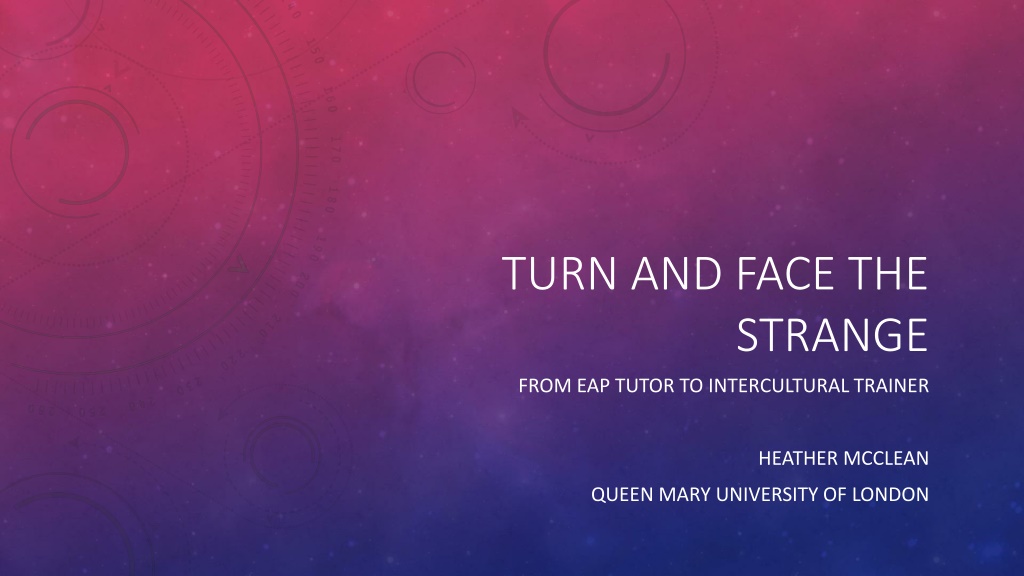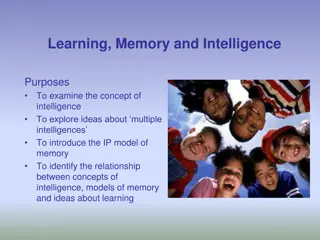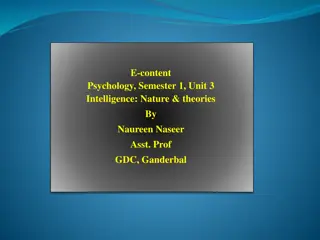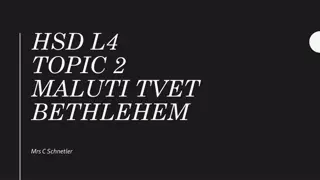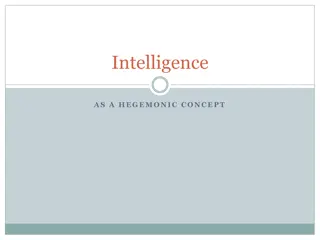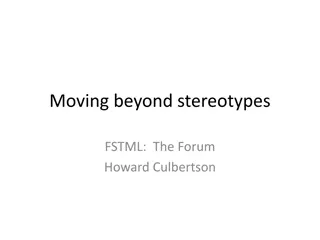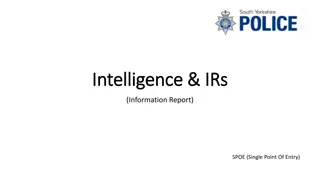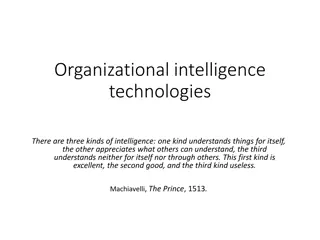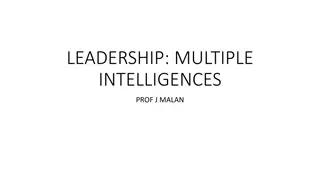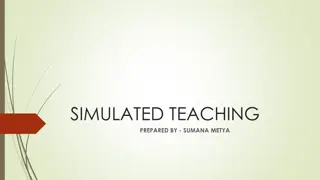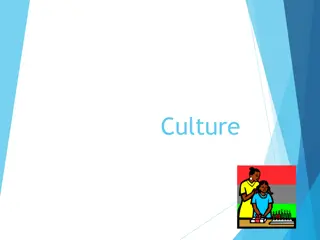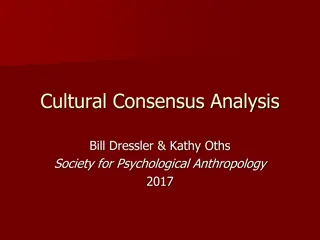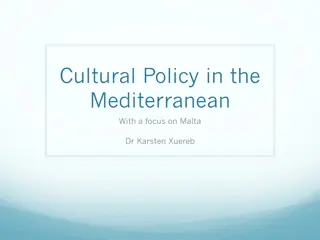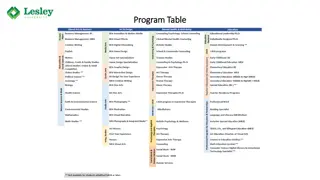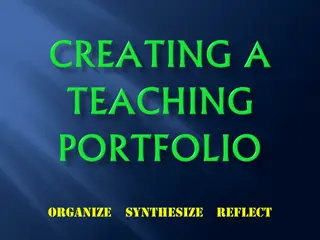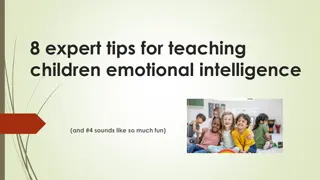Exploring Cultural Intelligence in Academic Teaching Strategies
Heather McClean, an intercultural trainer at Queen Mary University of London, conducted research on the correlation between cultural intelligence and teaching strategies among academic staff. The study revealed a clear knowledge gap regarding language levels and the need for scaffolding language, prompting the creation of EAP-led initiatives. While 95% of participants showed average to high cultural awareness, only 30% displayed high competencies in all four CQ elements, indicating areas for improvement in conveying knowledge effectively to international students.
- Cultural intelligence
- Academic teaching
- Intercultural competence
- EAP-led initiatives
- Research findings
Uploaded on Sep 29, 2024 | 0 Views
Download Presentation

Please find below an Image/Link to download the presentation.
The content on the website is provided AS IS for your information and personal use only. It may not be sold, licensed, or shared on other websites without obtaining consent from the author. Download presentation by click this link. If you encounter any issues during the download, it is possible that the publisher has removed the file from their server.
E N D
Presentation Transcript
TURN AND FACE THE STRANGE FROM EAP TUTOR TO INTERCULTURAL TRAINER HEATHER MCCLEAN QUEEN MARY UNIVERSITY OF LONDON
BIOGRAPHY Education & Recognition Adviser at Queen Mary University of London (January 2023-present) Head of EAP Programmes at University for the Creative Arts (June 2019-November 2022) 25+ years experience teaching EFL and EAP https://www.linkedin.com/in/heathermcclean/ https://www.qmul.ac.uk/queenmaryacademy/about/meet-the-team/profiles/heather-mcclean.html
SESSION AIMS & OUTLINE Introduce research into academics intercultural competence and their ability to scaffold knowledge effectively for international students Examine the effectiveness of four EAP-led initiatives designed to address identified knowledge and skills gap among academic staff Discuss rationale for EAP-led initiatives Make recommendations for future developments
CONTEXT Research conducted at University for the Creative Arts (UCA) in 2020 as part of the Internationalisation of Curriculum action plan Clear knowledge gap among staff (especially regarding language levels and the need for grading/scaffolding language) Informally identified through: sitting in on taught sessions; reading assessment briefs; conversations with lecturers regarding students language ability; regular requests for a Chinese interpreter Research aim: to investigate (a) academics intercultural competence; (b) their ability to convey knowledge effectively to international students; and (c) to see whether there was a correlation between the two
HOW DOES CULTURAL INTELLIGENCE CORRELATE TO ACADEMICS TEACHING STRATEGIES? Quantitative Data: questionnaires distributed to academic staff 50 returned (60% subject lecturers; 40% EAP tutors) Qualitative Data: in-depth interviews with 10 academic staff (subject lecturers and EAP tutors)
Livermore, 2011 Image from https://betterboards.net/
RESEARCH FINDINGS 95% of participants had average (55%) or high (40%) cultural awareness BUT Only 30% displayed high competencies in all four CQ elements Commonalities: worked overseas; speak a second language; 4+ years experience teaching international students AND 20% of participants unable to give any examples of adjusting teaching approach Commonalities: monolingual; less confident in multilingual contexts
RESEARCH FINDINGS: EAP TUTORS & SUBJECT LECTURERS SCAFFOLDING STRATEGIES EAP Tutors Subject Lecturers a. use of discourse strategies academic vocabulary development metacognitive strategies drawing on prior knowledge providing supportive materials (multimedia & semiotics) b. c. Mahan (2020)
RESEARCH CONCLUSIONS High CQ Drive and Knowledge does not necessarily equate to high CQ Strategy and Action Learning another language has a positive impact on CQ Strategy and CQ Action Need for knowledge exchange and collaboration between language and the disciplines Need for staff development and support to develop best practice in teaching in an internationalised university Yu, C. and McClean, H. (2022) International Student Success in the UK: scaffolding curriculum strategies and cultural intelligence. Chapter in: International Environments and Practices of Higher Education. Bingley: Emerald Publishing.
LITERATURE REVIEW 1. Attitudes towards international students: Fallon and Brown (1999) 2. Need for Professional Development for Academics in Internationalised Universities Washburn and Hargis (2017) Jin and Schneider (2019) 3. Strategies for Teaching International Students intercultural competence and linguistic adjustments Crose (2011) Gopal (2011) Haan, Gallagher and Varandani (2017) linguistically-responsive instruction 4. Scaffolding for International Students Mahan (2020) 5. Taking a Transcultural Approach Ryan (2011)
RATIONALE FOR EAP-LED APPROACH Work across a wide range of courses, so see first-hand how some international students struggle to cope with dense academic texts, academic lectures, or even understanding module handbooks and assessment requirements Solid theoretical knowledge of language levels and competencies Highly experienced at communicating with students from all linguistic backgrounds and abilities Wide-ranging experience of working in language schools with rolling intake therefore highly skilled at creating good group dynamics
EAP-LED INITIATIVES TO SUPPORT ACADEMICS 1. Staff development workshops: Communicating across Cultures (also for professional services staff) Teaching Students from Diverse Backgrounds: Scaffolding Strategies Teaching Students from Diverse Backgrounds: Group Dynamics 2. Co-teaching/co-creating workshops (EAP & subject lecturers) 3. EAP/subject lecturer peer observation scheme 4. Offering assessment brief readability/review service
1. STAFF DEVELOPMENT WORKSHOPS Communicating across Cultures (also for professional services staff) how culture affects communication; strategies to improve spoken and written communication Teaching Students from Diverse Backgrounds: Scaffolding Strategies why scaffolding is necessary and how to scaffold learning Teaching Students from Diverse Backgrounds: Group Dynamics how to build good group dynamics in a multilingual classroom
STAFF DEVELOPMENT WORKSHOPS: EVALUATION Workshops ran via L&D team at 6-week intervals Demand was overwhelming: Communicating Across Cultures most popular workshop L&D had run 194 staff attended between January and October 2022 with the majority (75%) attending Communicating Across Cultures Feedback from participants was 100% positive (post-workshop feedback forms & anecdotal feedback) Promotional materials need to show clear distinction between workshops so staff don t assume they all have similar content
STAFF DEVELOPMENT WORKSHOPS: EVALUATION Sample Quotes: It really helped me to re-evaluate my own communication. I liked the practical suggestions of what to do with regards activities in the classroom that will either give good scaffolding or will check learning. We got lots of practical tips that I can put into action, as well as things for me to consider in the longer term. This should be a compulsory part of new staff induction. There were lots of practical tips of things to do with students to get them to mix. My teaching has changed because of these workshops!
2. CO-TEACHING/CO-CREATING WITH LECTURERS September 2021 September 2022 five sessions co-created How to be a Student: an introduction to UK academic life (a 3-part workshop) Engaging with Art Crits: giving constructive feedback* Avoiding Plagiarism with Turnitin (a 2-part workshop)* Engaging with the Reading List Intercultural Group Work* *also co-taught
CO-TEACHING/CO-CREATION: EVALUATION Positive feedback from students (anecdotal and post-workshop feedback forms) Requests from all lecturers for repeat sessions with additional cohorts Most effective when co-taught, not just co-created Amount of subject lecturer interaction/input during sessions varied could be affected by relationship between staff, or confidence of subject lecturer Need to state roles/responsibilities/expectations clearly at the outset
3. EAP/SUBJECT LECTURER PEER OBSERVATION SCHEME EAP Tutors many opportunities for regular informal observations of subject lecturers, esp. if studio-based Subject lecturers Many on sessional contracts therefore many time/resource constraints Peer observations conducted by those who were already very engaged Reflections Subject lecturers need to see value of peer observation outside their discipline understand they are observing teaching practice Need guided support in place a guide for observers what should I look for? Provide questions to encourage self-reflection, e.g. How did the tutor check understanding? What did they do to encourage engagement?
4. ASSESSMENT BRIEF READABILITY/REVIEW SERVICE Completed review and edit of assessment briefs and programme specifications for 12 new BA programmes in July 2021
ASSESSMENT BRIEF READABILITY/REVIEW : EVALUATION Extremely labour-intensive! Increased visibility with PD and Senior Leadership Team Fix-it approach not developmental for subject lecturers Writing Accessible Assessment Briefs workshop more impactful
MEASURING IMPACT OF INITIATIVES Short-term: Have the staff said they found it helpful? Medium-term: Has teaching changed? Longer-term: Have changes been sustained?
NEXT STEPS Offer bespoke staff development workshops for Schools/Departments Leading specialist sessions on PGCHE (e.g. teaching in the internationalised classroom) Becoming an HEA Fellow and a mentor for the Fellowship Scheme
CONDITIONS FOR SUCCESS A supportive line manager Experienced EAP team Strong links with academic staff/ PDs/Departments who can champion initiatives in their Schools Representation on internal boards/committees/working groups Cultural capital (Ding, 2019) within the institution
REFERENCES Bond, B., 2020. Making language visible in the university: English for academic purposes and internationalisation. Multilingual Matters. Crose, B., 2011. Internationalization of the higher education classroom: Strategies to facilitate intercultural learning and academic success. International Journal of Teaching and Learning in Higher Education, 23(3), pp.388-395. Ding, A., 2019. EAP practitioner identity. In Specialised English. pp. 63-76 Routledge. Fallon, G. and Brown, R.B. , 1999. What About the Workers? Academic staff opinions about working with non UK postgraduate students in higher education. Journal of Further and Higher Education, 23 (1), pp 41-52. Gallagher, C., Haan, J. and Lovett, S., 2020. Faculty and international student perceptions of language performance and instructional support: A mismatch of expectations. TESOL Journal, 11(1). Gopal, A., 2011. Internationalization of higher education: Preparing faculty to teach cross-culturally. International Journal of Teaching and Learning in Higher Education, 23(3), pp.373-381. Haan, J.E., Gallagher, C.E. and Varandani, L., 2017. Working with linguistically diverse classes across the disciplines: Faculty beliefs. Journal of the Scholarship of Teaching and Learning, 17(1), pp.37-51. Jin, L. and Schneider, J., 2019. Faculty views on international students: A survey study. Journal of International Students, 9(1), pp.84-99.
REFERENCES Livermore, D., 2011. The Cultural Intelligence Difference: Master the One Skill You Can t Do without in Today s Global Economy. Amacom. Mahan, K.R., 2022. The comprehending teacher: Scaffolding in content and language integrated learning (CLIL). The Language Learning Journal, 50(1), pp.74-88. Murray, N. and McConachy, T., 2018. Participation in the internationalized higher education classroom: An academic staff perspective. Journal of International and Intercultural Communication, 11 (3), pp 254-270. Ryan, J., 2011. Teaching and learning for international students: towards a transcultural approach. Teachers and Teaching, 17:6, pp 631-648. Washburn, C. and Hargis, J., 2017. Changes in faculty practice for international students: A case study. Transformative Dialogues: Teaching and Learning Journal, 10(1). Yu, C. and McClean, H. 2022. International Student Success in the UK: scaffolding curriculum strategies and cultural intelligence. In: International Environments and Practices of Higher Education. pp. 115-127 Emerald Publishing Limited.
THANK YOU FOR LISTENING! h.mcclean@qmul.ac.uk https://www.linkedin.com/in/heathermcclean/ https://www.qmul.ac.uk/queenmaryacademy/about/meet-the-team/profiles/heather-mcclean.html
